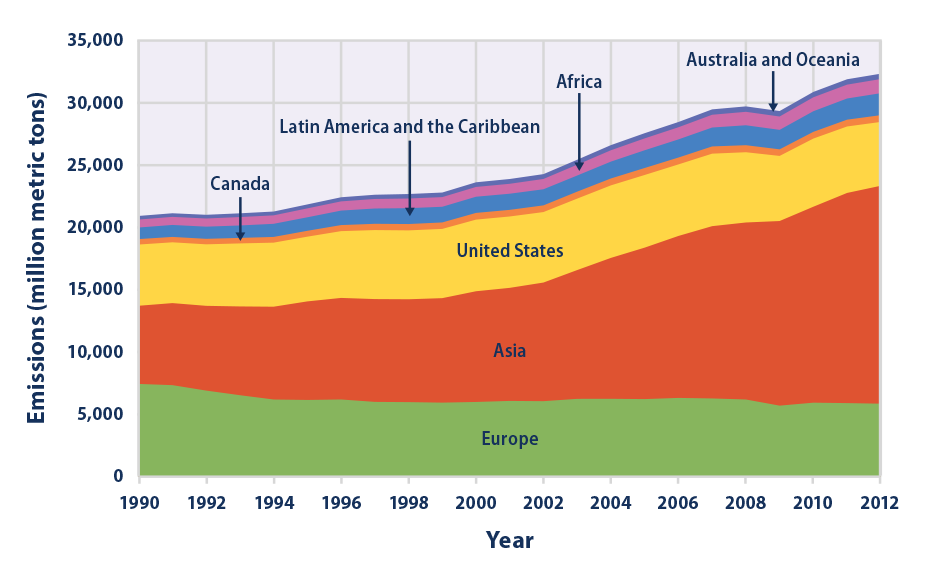Xi's Climate Strategy: China's Path To Lower Emissions Without The US

Table of Contents
Domestic Drivers of China's Climate Action
Several crucial domestic factors propel China's commitment to climate action.
Environmental Concerns and Public Pressure
Growing public awareness of severe air and water pollution, and their devastating impacts on public health, has fueled a groundswell of demand for cleaner energy and stricter environmental regulations. This public pressure has forced the government to prioritize environmental protection.
- Numerous public protests against pollution have taken place across China, highlighting citizen concerns.
- Environmental activism, though often facing constraints, plays a significant role in raising awareness and pushing for reforms.
- The government has responded with increasingly stringent environmental regulations and initiatives targeting air and water quality.
Economic Opportunities in Green Technologies
China recognizes the immense economic opportunities presented by green technologies. Massive investments in renewable energy, electric vehicles (EVs), and other green sectors are driven by both economic incentives and the ambition to become a global leader in technological innovation.
- Chinese companies are at the forefront of renewable energy manufacturing, dominating the global solar panel market.
- Government subsidies and supportive policies encourage the adoption of electric vehicles and the development of related infrastructure.
- China's green technologies boast considerable export potential, contributing to both domestic economic growth and global green transitions.
Energy Security and Dependence Reduction
A core element of Xi's Climate Strategy is reducing reliance on imported fossil fuels to bolster national energy security and independence. This strategy aligns directly with emission reduction goals.
- China is aggressively expanding its domestic renewable energy capacity, including solar, wind, and hydropower.
- Efforts are underway to diversify energy imports, lessening dependence on specific regions and geopolitical vulnerabilities.
- This strategic shift enhances energy resilience and reduces reliance on potentially unstable fossil fuel markets.
Xi's Climate Strategy: Key Policies and Initiatives
Xi's Climate Strategy is characterized by a series of ambitious policies and initiatives.
Carbon Neutrality Goals and Timelines
China has pledged to achieve carbon neutrality before 2060, a monumental undertaking demanding a rapid decarbonization of its economy. This commitment involves significant policy adjustments and substantial infrastructural changes.
- Specific targets and timelines for emission reductions have been set at both national and regional levels.
- A range of policy mechanisms, including carbon trading schemes and stricter emission standards, are being implemented.
- However, achieving these goals faces significant regional variations in implementation and developmental challenges.
The Role of the Belt and Road Initiative (BRI)
The Belt and Road Initiative (BRI) is not merely an economic strategy; it also incorporates elements of sustainable development and green infrastructure, extending China's climate action influence internationally.
- Many BRI projects prioritize renewable energy sources, such as solar and wind power plants, in participating countries.
- Investments in sustainable transportation infrastructure, including high-speed rail and improved road networks, are integral to the BRI.
- Environmental protection initiatives are increasingly integrated into BRI projects, promoting sustainable development in partner nations.
Challenges and Obstacles to Implementation
Despite the ambitious goals, implementing Xi's Climate Strategy faces substantial obstacles.
- Transitioning away from coal, a major energy source in China, poses a significant economic and technological challenge.
- Managing regional disparities in development and ensuring equitable access to clean energy require careful planning and resource allocation.
- Ensuring consistent policy implementation and achieving compliance across diverse sectors and regions necessitates strong regulatory frameworks.
China's Climate Strategy Without US Collaboration
China's climate action is largely independent of US-led initiatives, highlighting its proactive approach to international climate diplomacy.
Independent Action and International Partnerships
China actively engages in climate action outside the framework of US-led agreements, forging partnerships and collaborations with other nations and international organizations.
- China has signed numerous bilateral agreements with other countries on climate cooperation and technology transfer.
- It plays a leading role in multilateral climate initiatives, including the United Nations Framework Convention on Climate Change (UNFCCC).
- China's increasing leadership in international climate forums demonstrates its commitment to shaping global climate governance.
Implications for Global Climate Change Efforts
China's independent climate strategy profoundly impacts global efforts to mitigate climate change.
- Its significant emission reductions could contribute substantially to global climate goals, even without direct US collaboration.
- However, the lack of significant joint action with the US could potentially hinder the speed and effectiveness of global climate mitigation efforts.
- The nature of China's international partnerships will define the future trajectory of global climate cooperation and the potential for enhanced global action or hindered progress.
Conclusion: Assessing Xi's Climate Strategy and the Future Path
Xi's Climate Strategy represents a significant undertaking, driven by a confluence of domestic pressures, economic opportunities, and strategic considerations. China's commitment to carbon neutrality, despite its independent approach, plays a vital role in global climate change efforts. While substantial challenges remain in policy implementation and technological hurdles, the initiative demonstrates a proactive approach to emission reductions and sustainable development. The success of Xi's Climate Strategy will significantly influence global climate change mitigation and international cooperation. Learn more about Xi's Climate Strategy and its far-reaching implications for the global fight against climate change. Explore resources from organizations like the International Energy Agency (IEA) and the UNFCCC for a deeper understanding of China's climate policies and their global impact.

Featured Posts
-
 Sadie Sink Visits Stranger Things Broadway Cast A Night Off Photo
Apr 25, 2025
Sadie Sink Visits Stranger Things Broadway Cast A Night Off Photo
Apr 25, 2025 -
 Increased Opposition To Ev Mandates From Car Dealerships
Apr 25, 2025
Increased Opposition To Ev Mandates From Car Dealerships
Apr 25, 2025 -
 Alterya Joins Chainalysis Boosting Blockchain Security With Ai
Apr 25, 2025
Alterya Joins Chainalysis Boosting Blockchain Security With Ai
Apr 25, 2025 -
 Predicting The Eurovision 2025 Winner Top Contenders
Apr 25, 2025
Predicting The Eurovision 2025 Winner Top Contenders
Apr 25, 2025 -
 Chinas New Emissions Targets Xis Commitment At Climate Talks Despite Us Absence
Apr 25, 2025
Chinas New Emissions Targets Xis Commitment At Climate Talks Despite Us Absence
Apr 25, 2025
